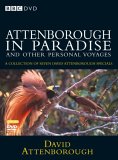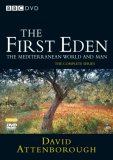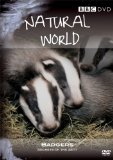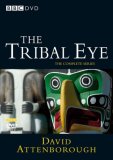![The Living Planet [1983]](/pictures/1032243.jpg) The Living Planet | DVD | (01/09/2003)
from £17.07
| Saving you £17.92 (104.98%)
| RRP
The Living Planet | DVD | (01/09/2003)
from £17.07
| Saving you £17.92 (104.98%)
| RRP In 1979 David Attenborough presented Life on Earth, the first wildlife blockbuster series, a chronicle of three-and-a-half billion years of natural history. The Living Planet followed five years later, an equally ambitious 12-part documentary which spanned the globe with portraits of each of the major geographical regions which offer home to life. Attenborough demonstrates how even in the most hostile of environments, from the volcanic "Furnaces of the Earth" to "The Frozen World" of mountains and tundra, the Arctic and Antarctic, live maintains a foothold. He takes us to "The Northern Forests", the "Jungle", "Seas of Grass" and "The Baking Deserts", and ever the genial host, details how in all its endless diversity, life is ingeniously suited to its surroundings. With breathtaking imagery we meet our fellow inhabitants, from penguins to polar bears, lions to scorpions, oaks to eagles, and journey on to "The Open Ocean" and the "New Worlds" which mankind itself is rapidly fashioning through ever more radical technological change. The series ends with an impassioned environmental plea which rings even more urgent now than in 1984. The Trials of Life (1990) and The Private Life of Plants (1994) further detail The Living Planet. --Gary S. Dalkin
 Attenborough In Paradise: The David Attenborough Specials | DVD | (22/08/2005)
from £10.78
| Saving you £9.21 (46.10%)
| RRP
Attenborough In Paradise: The David Attenborough Specials | DVD | (22/08/2005)
from £10.78
| Saving you £9.21 (46.10%)
| RRP This release is a collection of the one-off programmes that the mercurial Sir David Attenborough has recorded over his first 50 years in broadcasting. Episodes Include: 1. Attenborough In Paradise - Broadcast 08/04/1996 2. The Lost Gods Of Easter Island - Broadcast 24/04/2000 3. The Amber Time Machine - Broadcast 15/02/2004 4. Bowerbirds: The Art Of Seduction - Broadcast 17/12/2000 5. The Song Of The Earth- Broadcast 23/12/2000 6. A Blank On The Map - Broadcast 29/12/197
![Planet Earth/Life [DVD]](/pictures/1096556.jpg) Planet Earth/Life | DVD | (30/11/2009)
from £22.89
| Saving you £15.10 (65.97%)
| RRP
Planet Earth/Life | DVD | (30/11/2009)
from £22.89
| Saving you £15.10 (65.97%)
| RRP Planet Earth & Life Box Set
 The First Eden | DVD | (27/08/2007)
from £N/A
| Saving you £N/A (N/A%)
| RRP
The First Eden | DVD | (27/08/2007)
from £N/A
| Saving you £N/A (N/A%)
| RRP Sir David Attenborough reviews the history of mankind's relationship with the natural world in the lands around the Mediterranean.
![Planet Earth/Life [Blu-ray]](/pictures/1096557.jpg) Planet Earth/Life | Blu Ray | (30/11/2009)
from £33.09
| Saving you £26.90 (81.29%)
| RRP
Planet Earth/Life | Blu Ray | (30/11/2009)
from £33.09
| Saving you £26.90 (81.29%)
| RRP Titles comprise: Life: This ten-part natural history blockbuster shot in HD is the definitive exploration of the diversity of life on Earth revealing the most spectacular and fascinating behaviour driven by the endless struggle to survive. Life stars a cast of 'box-office' wildlife characters filmed on every continent and in every habitat across the world with each drama-filled episode entirely dedicated to one of the planet's ten most important wildlife groups. Planet Earth: Four years in production over 2000 days in the field using 71 cameramen filming across 204 locations in 62 countries this is the ultimate portrait of our planet. A stunning television experience that combines rare action unimaginable scale impossible locations and intimate moments with our planet's best-loved wildest and most elusive creatures.
![Life in the Freezer (Repackaged) [DVD]](/pictures/1118560.jpg) Life in the Freezer (Repackaged) | DVD | (24/09/2012)
from £13.05
| Saving you £3.94 (30.19%)
| RRP
Life in the Freezer (Repackaged) | DVD | (24/09/2012)
from £13.05
| Saving you £3.94 (30.19%)
| RRP At one and a half times the size of the United States, it has a year round population of only 800 people. Three quarters of the world's fresh water envelops it in a layer of ice so thick it conceals mountain ranges as vast as the Alps. And with temperatures seventy degrees below zero centigrade and winds of up to 120 mph, Antartica is the coldest, loneliest place on Earth. But it is also a place of majestic beauty which can support astonishingly rich and varied forms of wildlife. Presented b...
![School For Secrets [DVD]](/pictures/1097790.jpg) School For Secrets | DVD | (08/02/2010)
from £9.98
| Saving you £0.01 (0.10%)
| RRP
School For Secrets | DVD | (08/02/2010)
from £9.98
| Saving you £0.01 (0.10%)
| RRP School for Secrets tells the inside story of the 'Boffins' - Britain's backroom boys - who developed the miracle discovery of radar and helped stave off the German invasion of Britain in 1940. Five different scientists led by Professor Heatherville (Ralph Richardson) are brought together and work in total secrecy and under incredible pressure in a race against time to develop this vital weapon. Their dedication disrupts their family lives as they are forced to sacrifice everything to make the great breakthrough. Their success is illustrated by the effect Radar has on the fighting abilities of the RAF over the skies of Britain in those crucial summer and autumn months of 1940. However Germany is also planning its own Radar capability and British commandos must be despatched to strike at a vital Nazi installation Written produced and directed by Peter Ustinov and boasting a distinguished supporting cast including Richard Attenborough David Tomlinson and John Laurie this film celebrates one of Britain's greatest wartime achievements.
![The Blue Planet - 3 DVD Box Set [2001]](/pictures/1032694.jpg) The Blue Planet - 3 DVD Box Set | DVD | (03/12/2001)
from £6.65
| Saving you £23.34 (350.98%)
| RRP
The Blue Planet - 3 DVD Box Set | DVD | (03/12/2001)
from £6.65
| Saving you £23.34 (350.98%)
| RRP An epic, eight-part series that took five years to complete, The Blue Planet firmly re-establishes the BBC as the world's pre-eminent producer of top quality nature documentaries. Exploring every aspect of marine ecosystems, from coastal marshes to deep-sea trenches and from polar waters to tropical reefs, The Blue Planet is thorough and informative, yet never less than thrilling. Sir David Attenborough is one of the most well-respected (and well-known) personalities in the field of nature programmes and his narration is flawless as he educates and inspires without patronising his audience or anthropomorphising his subjects. Spectacular camera work (of a standard not seen since the BBC's classic Life on Earth series) captures images of a fascinating world rarely seen by human eyes--in fact, in several instances, the subjects and behaviours filmed for this series have never been witnessed before, let alone caught on camera. This is particularly apparent on the series highlight, "The Deep" (Programme 2), where film crews discovered two new species in the depths of the ocean: a grotesque fish named the Hairy Angler and a fantastic, pink octopus-like creature, which is so new that it remains unnamed (but was nicknamed "Dumbo"). Both are testament to the fact that, although oceans cover two-thirds of the Earth, we know less about them than we do the moon. It is proof that, to us land-dwellers, much of our Blue Planet is alien indeed. A handsomely illustrated companion book is also available. -- Robert Burrow
 Natural World - Badgers - Secrets Of The Set | DVD | (18/08/2008)
from £17.10
| Saving you £-12.11 (N/A%)
| RRP
Natural World - Badgers - Secrets Of The Set | DVD | (18/08/2008)
from £17.10
| Saving you £-12.11 (N/A%)
| RRP Badgers are loved by some and hated by others. Yet few people have ever seen one alive. So how does the badger maintain its secret life? This film follows a badger family throughout the year from the birth of their tiny cubs deep underground to their spring emergence discovery of summer scenery and encounters with people and wild neighbours. Set against the idyll of country life on a working farm this film uncovers the dark and light side of the badger as never seen before. What is revealed is a surprising entertaining and moving account of the country's most respected and endlessly watchable wild inhabitant
 The Tribal Eye | DVD | (27/08/2007)
from £N/A
| Saving you £N/A (N/A%)
| RRP
The Tribal Eye | DVD | (27/08/2007)
from £N/A
| Saving you £N/A (N/A%)
| RRP Series of 7 programmes which relate masterpieces of the world's tribal art to the people and places that produced. David Attenborough visits a cliff-dwelling tribe in the Mali desert investigates the sadly vanishing culture of the North West American Indian tribes explores the wealth and culture of the Aztecs and Incas of Central and South America and looks at the remarkable sculptures created by the bus people in the New Hebrides.
![Life And Death of Colonel Blimp, The / A Matter Of Life And Death [1943]](/pictures/1012570.jpg) Life And Death of Colonel Blimp, The / A Matter Of Life And Death | DVD | (17/03/2003)
from £N/A
| Saving you £N/A (N/A%)
| RRP
Life And Death of Colonel Blimp, The / A Matter Of Life And Death | DVD | (17/03/2003)
from £N/A
| Saving you £N/A (N/A%)
| RRP Two masterpieces of British cinema are paired here--Powell and Pressburger's first Technicolor triumph, The Life and Death of Colonel Blimp (1943) and their even more ambitious A Matter of Life and Death (1946). Both pictures are transcendent examples of the filmmakers' craft, and remain models of great cinema long after their original wartime propaganda brief has expired. Based on a famously satirical cartoon strip that mocked outmoded attitudes of fair play at a time of "total war", Blimp subsequently became notorious as the film Churchill tried to have banned. Because the War Office objected to the screenplay, they refused to allow P&P's first choice for the role, Laurence Olivier, and the duo cast unknown stage actor Roger Livesey in his place. It is Livesey's sympathetic performance that transforms Clive "Sugar" Candy from an object of satire to one of warm affection, effectively reversing the film's intended message about old-fashioned decency versus wartime pragmatism. Anton Walbrook is a profound presence in a role that mirrored the actor's own plight as a German in Britain, while Deborah Kerr is a living leitmotif in the film, playing no fewer than three distinct but deliberately related roles. Briefed by the Ministry of Information to make a film that would foster Anglo-American relations in the post-war period, the duo, known as "the Archers", came up with A Matter of Life and Death, an extravagant and extraordinary fantasy in which David Niven's downed pilot must justify his continuing existence to a heavenly panel because he has made the mistake of falling in love with an American girl (Kim Hunter) when he really should have been dead. National stereotypes are lampooned as the angelic judges squabble over his fate. In a neat reversal of expectations, the heaven sequences are black and white, while earth is seen in Technicolor. Daring cinematography mixes monochrome and colour, incorporates time-lapse images, and even toys with background "time freezes" 50 years before The Matrix. Roger Livesey and Raymond Massey lead the fine supporting cast. On the DVD: The Life and Death of Colonel Blimp and A Matter of Life and Death are presented in reasonably sharp 4:3 ratio with good mono sound. Blimp comes with a 25-minute documentary feature that tells us nothing revelatory about making the film, but has good new interviews with cinematographer Jack Cardiff (then an apprentice) and eloquent admirer Stephen Fry. Text biographies and stills are also included. Life and Death has no extras. --Mark Walker
![State of the Planet (Repackaged) [DVD]](/pictures/1118568.jpg) State of the Planet (Repackaged) | DVD | (24/09/2012)
from £15.25
| Saving you £0.74 (4.85%)
| RRP
State of the Planet (Repackaged) | DVD | (24/09/2012)
from £15.25
| Saving you £0.74 (4.85%)
| RRP Over the course of three episodes, David works with experts to ask whether nature really is in a crisis of species extinction, to examine why has this come about and finally to understand what options for the future remain open to us. His quest takes him on a truly global trail, from Kenya to Ecuador, from the Philippines and the Maldives to Easter Island, and from South Africa to California - visiting habitats of threatened species and exploring ways in which life can be sustained for the fu...
![Fossil Detectives Box Set [DVD]](/pictures/1103324.jpg) Fossil Detectives Box Set | DVD | (11/10/2010)
from £27.69
| Saving you £2.30 (8.31%)
| RRP
Fossil Detectives Box Set | DVD | (11/10/2010)
from £27.69
| Saving you £2.30 (8.31%)
| RRP There has been life in Britain for more than a billion years and when dinosaurs roamed our land and strange sea monsters swam in our seas they left fascinating clues behind. Fossils hold the key to discovering the mysteries of ancient life and provide a tantalizing glimpse of worlds long gone. The Fossil Detectives are on a journey throughout the British Isles piecing together the clues that unlock the secrets of Britain's extraordinary past. Fossil Detectives showcases Britain's amazing wealth of fossil remains inspiring the explorer in all of us. Each packed episode is based in a different region of Britain breathing life into the country's most spectacular fossil finds and discovering how fossils are at the cutting edge of scientific research. So join Hermione Cockburn and a host of other top fossil loving celebrities including Sir David Attenborough and Blur's Alex James on a fossil adventure.
 David Attenborough Box Set 2: Life on Earth, The Living Planet and The Private Life of Plants | DVD | (01/09/2003)
from £N/A
| Saving you £N/A (N/A%)
| RRP
David Attenborough Box Set 2: Life on Earth, The Living Planet and The Private Life of Plants | DVD | (01/09/2003)
from £N/A
| Saving you £N/A (N/A%)
| RRP This second David Attenborough DVD Box Set contains three of his natural history series, all presented complete: Life on Earth The Living Planet The Private Life of Plants
 David Attenborough's Life on Land : A DVD Encyclopaedia | DVD | (03/11/2008)
from £89.25
| Saving you £10.74 (12.03%)
| RRP
David Attenborough's Life on Land : A DVD Encyclopaedia | DVD | (03/11/2008)
from £89.25
| Saving you £10.74 (12.03%)
| RRP Twenty years ago David Attenborough started making a series of programmes about the different groups of living organisms that inhabit the lands of our planet - birds and mammals plants and insects amphibians and reptiles. He looked at the history of each one from its first appearance and surveyed the multitude of different forms into which it now involved. These landmark series now form David Attenborough's 15 disc Life on Land DVD Encyclopaedia and are brought to you here in the order in which these various groups arrived during the history of life. All the series in this Life on Land DVD Encyclopaedia have been indexed to provide rapid reference to each species mentioned and to behavioural categories such as mimicry camouflage or conflict. The index can be accessed on screen through the menu on each of the discs alternatively a precise reference can be found in the hard-backed book which accompanies the collection.
![The Trials Of Life [1990]](/pictures/1032562.jpg) The Trials Of Life | DVD | (16/09/2002)
from £N/A
| Saving you £N/A (N/A%)
| RRP
The Trials Of Life | DVD | (16/09/2002)
from £N/A
| Saving you £N/A (N/A%)
| RRP The Trials of Life started as David Attenborough's most ambitious wildlife project, and ended as something really big. First came Life on Earth (1978), then The Living Planet (1984), but when The Trials of Life (1990) arrived the already epic individual series became "The Life Trilogy", collectively the most impressive documentary achievement in the history of television. Unfortunately the epic has shrunk here, as not only have the credits been removed, but each of the 12 original episodes having been cut from 49 minutes to 28 minutes (though the scene everyone remembers--a whale pursuing its prey right onto the beach--survives). Rather than focus on evolution or geography, the emphasis is on animal behaviour, from courting and mating, to giving birth and raising the young, hunting, flight and fighting, finding shelter, and migration. This immediacy makes The Trials of Life the most accessible of "The Life Trilogy" for younger children, though the abridgement makes it play like a superior schools programme. This short-attention-span version of a television masterpiece simply makes one wish for a fully restored, extra packed special edition of the complete series. David Attenborough would go on to make The Private Life of Plants and The Life of Birds. --Gary S Dalkin On the DVD: The Trials of Life has a good though slightly soft and grainy 4:3 picture that would benefit from remastering from the original elements. The stereo sound is a clear improvement over the originally broadcast mono, but a full 5.1 DTS remix would have brought out the best in the atmospheric natural location recording. The only extra is a 49-minute "making of" documentary, "Once More into the Termite House", originally shown as a companion to the series. Given a DVD all to itself, this programme offers a real insight into the challenges of making such a vast programme, while David Attenborough is as affable as ever. There are optional English and Greek subtitles on all three discs. --Gary S Dalkin
![David Attenborough Collection -- Trials of Life, Life in the Freezer, Life of Birds [1990]](/pictures/1032563.jpg) David Attenborough Collection -- Trials of Life, Life in the Freezer, Life of Birds | DVD | (16/09/2002)
from £N/A
| Saving you £N/A (N/A%)
| RRP
David Attenborough Collection -- Trials of Life, Life in the Freezer, Life of Birds | DVD | (16/09/2002)
from £N/A
| Saving you £N/A (N/A%)
| RRP  Gerald Durrell - Himself And Other Animals | DVD | (07/02/2005)
from £4.99
| Saving you £4.00 (80.16%)
| RRP
Gerald Durrell - Himself And Other Animals | DVD | (07/02/2005)
from £4.99
| Saving you £4.00 (80.16%)
| RRP This is the story of author and naturalist Gerald Durrell founder of Jersey Zoo and the Durrell Wildlife Conservation Trust. The story is told by Gerald himself HRH The Princess Royal who is patron of the Trust and actor and writer John Cleese. The programme is introduced by Sir David Attenborough.
![Natural World - Badgers: Secrets of the Sett [DVD] [2008]](/pictures/1136495.jpg) Natural World - Badgers: Secrets of the Sett | DVD | (17/09/2012)
from £N/A
| Saving you £N/A (N/A%)
| RRP
Natural World - Badgers: Secrets of the Sett | DVD | (17/09/2012)
from £N/A
| Saving you £N/A (N/A%)
| RRP Badgers are loved by many and hated by others, yet very few people have ever seen one in real life. So how does the badger maintain this secret life? This film follows a badger family throughout the year, from the birth of their tiny cubs deep underground to their spring emergence, discovery of summer scenery and encounters with people and wild neighbours. Set against the idyll of country life on a working farm, this film uncovers the dark and light side of the badger as never seen before. Wh...
![Planet Earth [HD DVD]](/pictures/1075822.jpg) Planet Earth | HD DVD | (12/11/2007)
from £70.39
| Saving you £-20.40 (N/A%)
| RRP
Planet Earth | HD DVD | (12/11/2007)
from £70.39
| Saving you £-20.40 (N/A%)
| RRP As befits the BBC's reputation for producing some of the world's best nature documentaries, Planet Earth is an epic travelogue, focussing on different ecologies and the unique animals that inhabit them. Once again, Sir David Attenborough provides the narration, as the cameras fly across the surface of the earth, zooming in to give us a bug's eye view one minute, zooming out to give us an eagle's perspective the next. The BBC's cameramen filmed more than 200 locations, resulting in some truly spectacular footage, much of which has never before been seen--such as the rare sight of an endangered snow leopard hunting in the Himalayas, or great white sharks leaping from the water as they hunt. The creators of Planet Earth endured some of the world's most hostile environments, from the deepest ocean depths to an Antarctic blizzard to a fetid, cockroach- and bat-infested cave, just to grab a few moments of film; it's worth watching the "Making of" shorts that accompany each episode, in order to see just what lengths they had to go to. The three extra episodes here--Planet Earth: The Future--provide a sobering finale, as Sir David practically pleads with viewers to cherish the animals that we share this planet with, before it's too late. --Ted Kord

Please wait. Loading...
This site uses cookies.
More details in our privacy policy